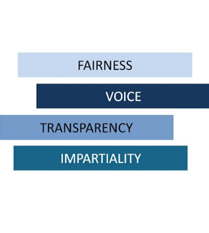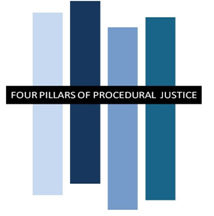Organizational Change through Decision Making and Policy: A New Procedural Justice Course for Managers and Supervisors

How is the concept of procedural justice applied to policing, and what does it really mean? “Procedural justice” refers to the idea of fairness in the processes that resolve disputes and allocate resources. It is a concept that, when embraced, promotes positive organizational change and bolsters better relationships.
Procedural justice speaks to four principles, often referred to as the four pillars: 1) being fair in processes, 2) being transparent in actions, 3) providing opportunity for voice, and 4) being impartial in decision making. The research of Yale University professor Tom Tyler and other leaders in the field has demonstrated that perceptions of fairness are driven not only by outcomes but also by the fairness and consistency of the processes used to reach those outcomes.1 But the four principles—or pillars—don’t stand alone; they support one another. The process of decision making also requires transparency and openness; that is, decisions should unfold out in the open as much as possible, and the reasoning behind decision making should be explained clearly when appropriate. People want an opportunity not only to understand what is happening but also to feel they have an opportunity for voice to ensure their side of the story is heard. No one likes to feel their future is being decided upon at another person’s whim; rather, people want voice or representation in decisions that may directly affect them. We all want decision making to be guided by impartiality, ensuring that biases did not influence the decision and ultimately the outcome.
When the four pillars of procedural justice are embraced—beginning with the executive leadership and continuing down through sworn and civilian supervisors—it may ultimately have an impact on the way front line officers and civilian personnel interact with the public.2 Procedural justice is a concept that promotes positive organizational change, bolsters better relations with the community, and enhances officers’ and civilian employees’ safety.
There are two areas of procedural justice as it applies to law enforcement: internal and external. Internal procedural justice refers to officers’ perceptions that their colleagues’ actions—particularly those of their supervisors—are fair and understandable, which demonstrates a key level of respect. Research on internal procedural justice indicates that officers who feel respected by their supervisors are more likely to understand why decisions were made; more likely to accept, support, and voluntarily comply with those decisions, including departmental policies; and less likely to challenge the decisions.3 Additionally, officers are happier at work, feel a greater sense of self worth, and are more willing to go the extra mile for the agency because they have a deeper connection to the agency’s mission and vision. This demonstrates that people are more willing to make sacrifices if the process is perceived to be procedurally just and if they are shown respect prior to the outcome.
Internal procedurally just behaviors lead to external procedurally just behaviors. External procedural justice focuses on the way law enforcement—particularly front line officers—and other legal authorities interact with the public. The characteristics of those interactions will have a direct and fundamental impact on public opinion often referred to as police “legitimacy.”4 Such interactions can either enhance or lower people’s opinions of law enforcement agencies and their personnel.
 Procedural justice is a framework with which officers can build effective policing efforts in their communities as they interact with the public. It refers to the practice of treating the public in all encounters fairly, providing them with voice during the interaction, and ensuring the process is transparent and impartial, thus demonstrating a level of respect. When the principles of procedural justice are applied—in all interactions—there is a greater willingness by the public to voluntarily obey the law and cooperate with the police, consequently decreasing overall crime rates and enhancing officer safety.5 External procedural justice also leads to relationships in which the community has increased trust and confidence in the police and believes there are shared interests, goals, and values between the community and police.6
Procedural justice is a framework with which officers can build effective policing efforts in their communities as they interact with the public. It refers to the practice of treating the public in all encounters fairly, providing them with voice during the interaction, and ensuring the process is transparent and impartial, thus demonstrating a level of respect. When the principles of procedural justice are applied—in all interactions—there is a greater willingness by the public to voluntarily obey the law and cooperate with the police, consequently decreasing overall crime rates and enhancing officer safety.5 External procedural justice also leads to relationships in which the community has increased trust and confidence in the police and believes there are shared interests, goals, and values between the community and police.6
Procedurally just policing has recently been endorsed by the President’s Task Force on 21st Century Policing7 and has long been embraced by the COPS Office to advance public safety and build relationships with communities. To that end, the COPS Office and the Center for Public Safety and Justice at the University of Illinois at Chicago, with key researchers and law enforcement executives, developed the Procedural Justice for Law Enforcement Agencies: Organizational Change through Decision Making and Policy course. This course introduces sworn and civilian law enforcement management and supervisors to the philosophy of procedural justice and provides practical steps for its internal implementation. The goal of the course is to increase knowledge, provide guidance, and offer examples of how to incorporate the principles of procedural justice into organizational decision making, policies, and procedures, creating an environment where these core principles are supported and practiced at all levels of the agency.
Target Audience
The target audience for this course is sworn and civilian law enforcement management and supervisors with roles and responsibilities in organizational decision making and developing, implementing, and enforcing agency policies and procedures.
Course Length
Eight hours (one day)
Course Structure
- Module 1: Introduction
- Module 2: The Pillars of Procedural Justice
- Module 3: Organizational Change through Leadership
- Module 4: Incorporating Procedural Justice into Policy
- Module 5: Recruiting and Recruit Training
- Module 6: Evaluation, Promotion, and Retention
- Module 7: Practices that Enhance Encounters with the Public
The Procedural Justice for Law Enforcement Agencies course is instructed by a highly qualified two-person team, bringing the perspectives both of executive level law enforcement and of an allied profession. To date, the course has been delivered in six states and is well received by participants based on course evaluations. One participant commented, “The entire course was outstanding. My favorite part was the leadership principles. We were all reminded of the reasons we became leaders of our organization.”
The movement from a community reaction of “that’s not fair” to “I understand” often rests within the individual police officer-community member interaction but is more often rooted in the deeper culture of the law enforcement agency. The philosophy of procedural justice aims at the heart of an organization’s culture and provides a structure for positive organizational transformation.
Inquiring about the Course
For all training inquiries, please contact the training coordinator, Katie Holihen, by phone at 312-996-8265 or by email at kholihen@illinois.edu.
Charlene Moe
Center for Public Safety and Justice
University of Illinois at Chicago
Melissa Bradley
Senior Policy Advisor and Managing Editor
COPS Office
References
1 R. Hollander-Blumoff and T.R. Tyler, “Procedural Justice in Negotiation: Procedural Fairness, Outcome Acceptance, and Integrative Potential,” Law & Social Inquiry 33, no. 2 (June 2008): 473–500, doi: 10.1111/j.1747-4469.2008.00110.x.2 Tom R. Tyler and Jeffrey Fagan, “Legitimacy and Cooperation: Why Do People Help Police Fight Crime in Their Communities?” Ohio State Journal of Criminal Law 6, no. 1 (Fall 2008): 231–275, http://moritzlaw.osu.edu/osjcl/Articles/Volume6_1/Tyler-Fagan-PDF.pdf.
3 Nicole Haas, Maarten Van Craen, Wesley Skogan, and Diego Fleitas, “Explaining Officer Compliance: The Importance of Procedural Justice and Trust inside a Police Organization,” Criminology and Criminal Justice (January 2015), http://crj.sagepub.com/content/early/2015/01/18/1748895814566288.full.pdf+html; COPS Office, “Comprehensive Law Enforcement Review: Procedural Justice and Legitimacy Summary,” accessed March 3, 2015, http://www.cops.usdoj.gov/pdf/taskforce/Procedural-Justice-and-Legitimacy-LE-Review-Summary.pdf.
4 T.R. Tyler, Why People Obey the Law (New Haven, CT: Yale University Press, 1990); M.S. Frazer, The Impact of the Community Court Model on Defendant Perceptions of Fairness: A Case Study at the Red Hook Community Justice Center (New York: Center for Court Innovation, 2006).
5 Jason Sunshine and Tom R. Tyler, “The Role of Procedural Justice and Legitimacy in Shaping Public Support for Policing,” Law and Society Review 37, no. 3 (September 2003): 513–548, doi: 10.1111/1540-5893.3703002.
6 Tom Tyler, Jonathon Jackson, and Ben Bradford, “Procedural Justice and Cooperation,” in Encyclopedia of Criminology and Criminal Justice, eds. Gerben Bruinsma and David Weisburd (New York: Springer, 2014), 4011–4024.
7 President’s Task Force on 21st Century Policing, Interim Report of The President’s Task Force on 21st Century Policing (Washington, DC: Office of Community Oriented Policing Services, 2015), 14, http://www.cops.usdoj.gov/pdf/taskforce/Interim_TF_Report.pdf.
April Photo Contest Winner | A New Procedural Justice Course | COPS Office Information Sharing Grants in CA | Measure CP for Free! | COPS Office Peer Reviewers | 2015 Sutin Award Open
